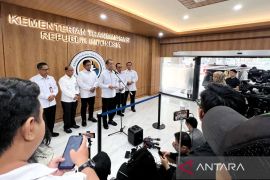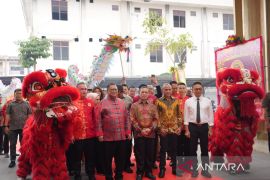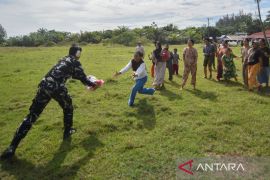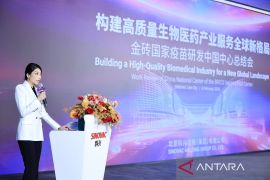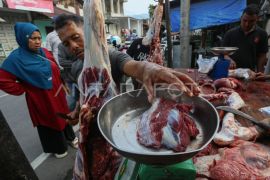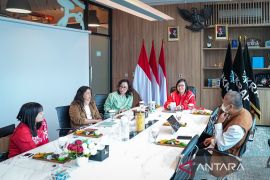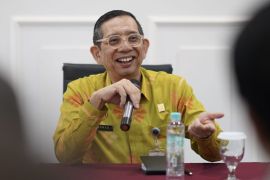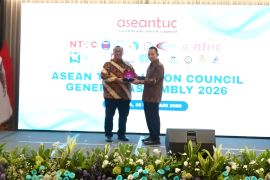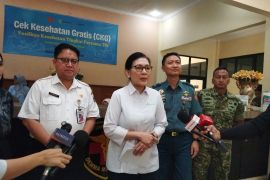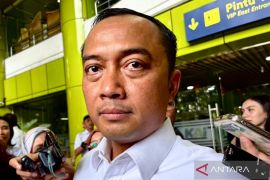Unlike Mahyeldi's inauguration during his first term when he was instated with Emzalmi, he is currently accompanied by Hendri Septa as the new deputy mayor of Padang.
He had emerged triumphant in the 2018 Padang Regional Election by securing 212,526, or 62.5 percent of the total valid votes.
The 2018 Padang Election was only contested by two pairs of candidates: number one Emzalmi-Desri supported by seven parties and number two Mahyeldi-Hendri Septa backed by the PKS and PAN.
Emzalmi is the incumbent deputy mayor of Padang, who was paired along with Mahyeldi during the 2013 Padang Regional Election and had emerged as the winner.
However, Emzalmi's deputy, Desri Ayunda, in the 2013 Padang regional election also ran as mayor while pairing with James Helyward
Mahyeldi was the mayor of the incumbent, who returned to run for office and paired up with Septa who is chairman of the National Mandate Party (PAN)'s Padang chapter.
Mahyeldi, who was a politician of the Prosperous Justice Party (PKS), had earlier served as the Padang mayor for the 2014-2019 period and had held the Padang deputy mayor's position for the 2009-2014 period.
Currently, entering the second term as mayor, it is time for Mahyeldi and his deputy to deliver proof and demonstrate dedication to continue development in the capital city of West Sumatra Province.
One thing that differs presently is that he is accompanied by a relatively young deputy, Septa. The man born in Padang on September 6, 1976, was not a new figure in the political arena of Padang City, as he had earlier served as a member of the Regional Representative Council of Padang for the 2009-2014 period.
Furthermore, Septa, who currently leads the PAN's Padang chapter, is also the son of Asli Chaidir, a member of the House of Representatives (DPR) in the West Sumatra electorate for the 2014-2019 period.
The figure, who continued his education at Monash University in Melbourne, then moved to Central Queensland University and completed his Masters of International Business at Deakin University.
After being appointed by West Sumatra Governor Irwan Prayitno, Mahyeldi and Hendri designed numerous work programs to continue development in the provincial capital.
Based on data compiled from the West Sumatra Central Statistics Agency (BPS), in 2018, Padang had 927,168 people spread across 11 sub-districts, with an area spanning 1,414.96 square kilometers.
In 2017, the economic growth of the city, nicknamed Bengkuang, was recorded at 6.23 percent, with the human development index at 81.58 percent and the gini ratio, or the level of inequality, at 0.34 percent.
With an inflation rate of 2.55 percent in 2018, the number of poor in Padang had reached 4.70 percent in 2018.
Challenge
Several issues to be tackled in Padang, range from improving the quality and competitiveness of human resources with the challenge of a large number of labor force that also followed the number of unemployed people.
Moreover, the other key areas of concern to create a decent city were the residents' accessibility to infrastructure and the provision of convenient public transportation, irrigation, and drainage facilities.
Not only focusing on achieving economic development that is inclusive and based on quality economic growth, community empowerment and poverty reduction have also become a homework to be completed.
Other priority areas are to bring about bureaucratic reforms and ensure good governance to ensure efficient and transparent public services.
Environmental preservation and community participation in disaster management are other areas of focus.
Flagship program
To this end, Padang Mayor Mahyeldi and Deputy Mayor Septa have harbored the vision of realizing superior education, trade, and tourism that is competitive in Padang City.
According to Mahyeldi, civil society is a civilized urban society and has a democratic life order that respects human rights, obeys the law, and respects justice.
Education prioritizes the development of the soul and character of the community, so that it is superior and has global competitiveness.
In the tourism sector, Padang is oriented towards halal tourism, while in the trade sector, it fosters inclusive development through the growth of small, medium, and micro enterprises and makes Padang the hub of trade. Halal is permissible under Islamic law.
To realize this vision, the Mahyeldi-Hendri pair has introduced 11 excellent programs for the coming five years to expedite development in the city.
Mahyeldi emphasized that broadly speaking, expediting development in the education, trade, and tourism sectors were the three priority areas.
He noted that during this time, his party is preparing a draft of the Mid-Term Development of Padang City for the 2019-2024 period.
He expounded on the first flagship program, specifically continuing road concretization, paving, and widening as well as improving drainage and integrated flood control mechanisms.
The second program pertained to boosting the effectiveness of bureaucratic reform, the work culture of apparatus, and public services, while the third concerned continuing the development of entrepreneurial institutionalization into the Gunung Padang Integrated Tourism Zone Cooperative, small islands in the eastern part of Padang City.
Furthermore, the fourth program was focused on continuing the implementation of Ramadan Islamic boarding schools, religious activities, cultural arts, and quality sports.
The fifth program is related to the arrangement of public transport with the opening of the new Trans Padang corridor as well as conducting management and traffic engineering to facilitate the movement of people and goods.
The sixth program was on construction of 500 new classrooms for elementary and junior high schools.
The seventh was revitalizing sports facilities and infrastructure at the level of RT/RW (the lowest level of administration) and creating parks in every sub-district and building creative centers and youth innovations or Youth Centers.
The eighth program was to boost the sub-district stimulant funds to Rp1 billion and village funds of Rp100 million annually and increase operational funds for teachers and mosque priests.
The ninth one concerned increasing the ease of business index in Padang while the 10th one encouraged the provision of subsidized housing for low-income communities.
The 11th one concerned building a thematic village for developing the local economy of the community in accordance with each region's potential.
Padang Deputy Mayor Septa highlighted that the prime program was an embodiment of the vision of realizing Padang City whose community has access to primer education, trade, and tourism that is competitive.
Editor: Bambang Purwanto
Copyright © ANTARA 2019

